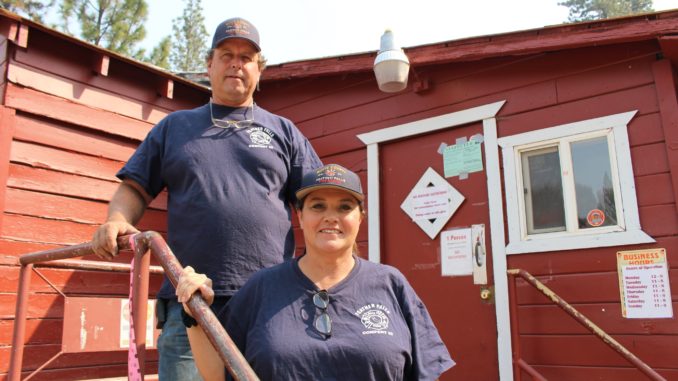
Katherine Molohon has called Berry Creek home for the entirety of her 34 years. As a child, she played in the mountain town’s creeks and walked its winding, wooded roads. She attended Berry Creek Elementary School and made pies for the annual Berry Festival to raise money for the town’s all-volunteer Butte County Fire Station 61. As an adult, she worked at Berry Creek School as a kitchen manager and seven years ago began serving at that same firehouse—just as her father, aunt and uncle had once done.
Throughout the long night of Sept. 8, Molohon and her small squad of fellow volunteers helped their neighbors evacuate and battled flames during the Bear Fire (now known as the “West Zone” of the North Complex Fire). By morning, most of her hometown—including the elementary school and even the fire station—was reduced to smoldering rubble. So was Molohon’s home, a cabin she shared with her boyfriend on the grounds of the historic—and now, also burned—Mountain House.
“It’s shitty … I’m still trying to process it,” Molohon said Sept. 16. She met with the CN&R in an Oroville parking lot that afternoon, between rushing around to gather living essentials (at that moment, dog beds) and outfit a shed in her parents’ yard in Oroville—where they moved two years ago, after nearly 50 years in Berry Creek—for living quarters. Her mother accompanied her, running errands in the younger woman’s 1996 Ford Explorer—which miraculously survived outside the burned fire station, though some of the front bumper melted.
“Basically, my whole childhood is gone,” she continued.
Molohon is not the only displaced Berry Creek firefighter. Six of the seven volunteers who compose the Station 61 fire brigade, including Chief Reed Rankin, lost their homes that night. Berry Creek and the neighboring, smaller community of Feather Falls—home to Volunteer Company 52—are two of the areas hardest hit by the still burning wildfire, which as of the CN&R’s deadline (Oct. 2) had claimed more than 300,000 acres and 15 lives. Of those fatalities, 13 were from Berry Creek and two from Feather Falls, and all occurred in the fire’s early hours. On that fateful night, volunteers from both towns put their own concerns aside, and risked everything to save their neighbors’ lives and property.
Volunteer brigade
According to Rick Carhart, public information officer for Cal Fire/Butte County Fire Department (the two agencies collaborate to provide the fire service in the county), Butte is home to 17 volunteer fire companies; the number of volunteers at each ranges between one and dozens, with the largest company based in Chico. Nationwide, volunteers account for roughly 73 percent of American firefighters, according to Cal Fire’s Butte Unit volunteer website.
Carhart said many volunteers take all of the same training as “career” firefighters and can become qualified in several areas of response: support, emergency medical services, equipment operations and wildland and structure firefighting. Some serve in simpler helping roles, like communications or cooking at fire stations.
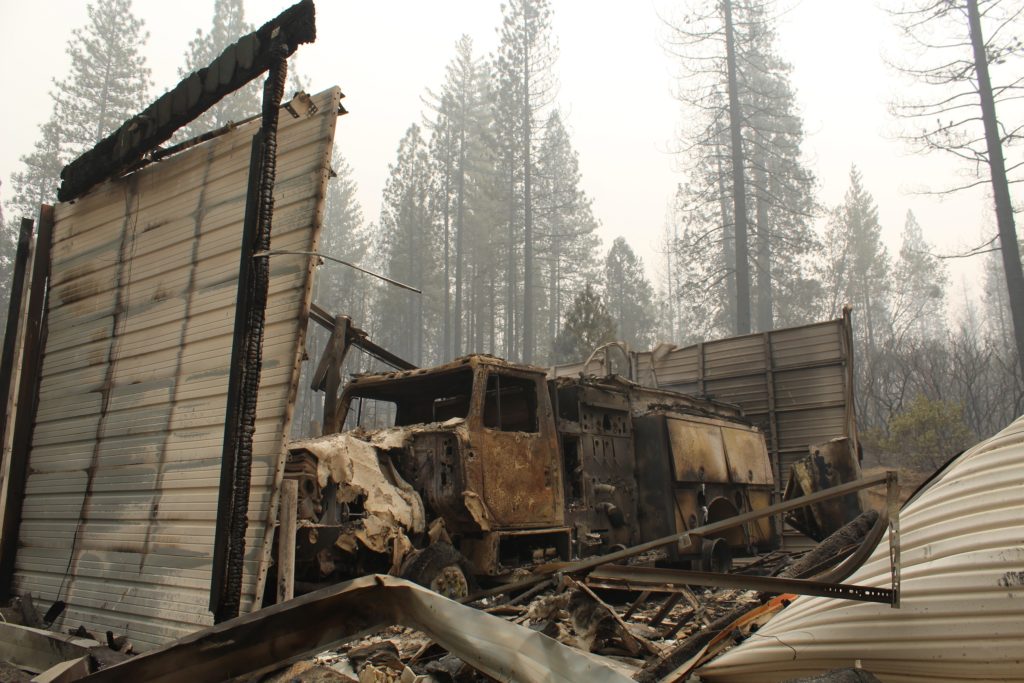
All volunteers carry pagers, and are alerted when medical or fire calls are received within their service area. Crews are also dispatched from the nearest career fire station, but volunteers are often the first on the scene. Carhart said about a half-dozen Butte volunteer companies have water tenders—large trucks capable of gathering water from hydrants, tanks or natural sources like creeks and lakes to deliver to other engines, or the front lines of a fire.
“The volunteer companies are very important and provide critical service and support,” Carhart said. “Without them, we couldn’t do what we do nearly as well.”
Fire family
The community of Feather Falls lies just over a ridge from Berry Creek. Though less than 10 miles apart as a bird flies, the towns are separated by a nearly one-hour drive along winding mountain roads.
Unlike the more established, decades-old Berry Creek unit, the Feather Falls Volunteer Fire Company numbers just two individuals—a married couple in their 50s named Sandy and Craig Bourasa. The Bourasas moved to Feather Falls six years ago, after Craig retired from a 33 year-career with the City of Hayward. They’ve loved the community far longer, though: For two decades it served as their retreat from city life, a place where they could take the kids to ride ATVs and enjoy time boating on Lake Oroville. They’ve owned property there for 16 years.
The couple also owns the Gold Flake Saloon, a cafe/bar/restaurant where they met the CN&R Sept. 26. The establishment, which they bought two years ago, is the town’s only business and is housed in a historic building that Sandy said is the only structure left standing from the town’s founding. A post office connected to the Gold Flake opened in 1888, when the community was called Mooretown. The post office and saloon also serve as hubs of the community, even when closed; dozens of work crews and fire and law enforcement personnel currently use the large parking lot as staging grounds.
Upon moving to Feather Falls, Craig wanted to join the volunteer fire department, but found there wasn’t one. So, he started one. Shortly after completing his training at the fire academy, he went on his first call.
“We didn’t have anything when I first started,” he said. “It was Company 52, but it was just me and my truck. My first fire [the Lumpkin Fire, a Sept. 2015 blaze that injured eight firefighters], I just showed up and they said, ‘You don’t have any equipment?’ I said, ‘Nope, just me.’
“That’s when I met Reed Rankin. He told me to hang out at his water tender and trained me with the pump handle that day.”
Rankin, Berry Creek’s chief, invited Craig to come train with the Berry Creek company every Tuesday, an offer he accepted. Aside from learning a lot and developing his skills, Craig also found camaraderie with the Berry Creek crew and started bringing his wife along. Sandy said sitting in on those sessions inspired her to join up herself. Both companies still meet regularly for training, assist one another on calls when possible and consider each other “family.”
Company 52 now has a water tender and some other equipment, but no fire station. They keep some equipment on their own property for fast response, while most is stored in a quonset hut on the grounds of the Feather Falls Grange Hall; the shed survived the fire, but the grange hall—where the community gathered for monthly breakfasts and other events—did not. A cardboard sign at the edge of the property aimed at recruiting more volunteers still stands, unscathed.
Night of …
“You could tell something was wrong all day, just by looking at the sky,” Sandy said of Sept. 8. “I closed the bar early and told everyone to evacuate, to get out of town, and then spent the day doing structure protection at our house.”
As Sandy stayed behind, readying to protect their home if need be, Craig went to man the water tender and spent the day pumping water from Lake Oroville at the Enterprise boat ramp to deliver to engines bound for the front lines. Early in the evening, Sandy heard radio chatter about firefighters falling back from Station 51, a career station farther up the hill where crews were staging, and knew it was time to leave.
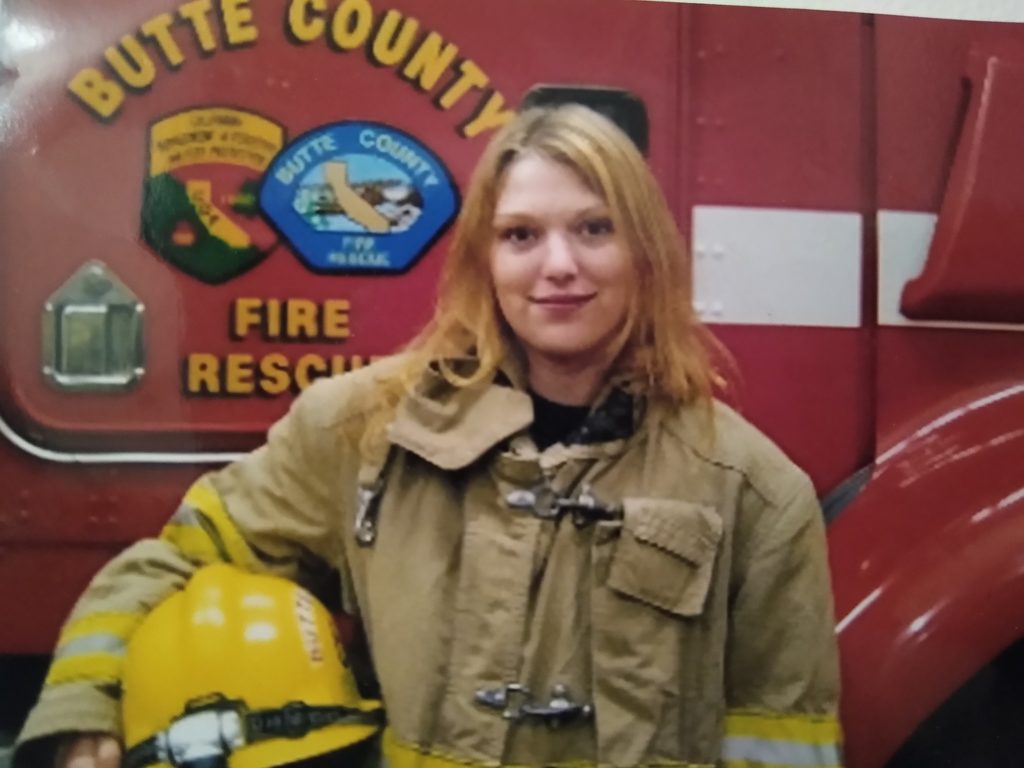
“I figured if these guys, the real professionals, are retreating, then I have no business thinking I could stop anything,” she said. “I called Craig to ask him if I should meet [him] at the water tender, and he said, ‘No, you need to get off the mountain.’”
Sandy said her skill set leans toward medical emergencies that account for the large majority of Company 52’s service calls and that she feared she’d be in the way in the firefight. So she evacuated to Oroville and put her communication skills to use, helping keep evacuees and fire personnel connected and updated.
As he made his runs up and down the hill, Craig found himself in the area of the Gold Flake as flames fast approached the building. Knowing he couldn’t singlehandedly stop the advancing wall of flame, he parked on a turn above the saloon known to locals as “Crash Corner” and prepared to watch the beloved bar burn. Then, in the nick of time, he heard over the radio that ground crews were showing up to protect the Gold Flake. He joined them as they pulled into the parking lot.
“The hand crews went crazy, they jumped straight out and started cutting everything to remove some of the heat, and doing some small backfiring,” Craig said. “They didn’t have much time for prepping, because before we knew it, the fire was here.
“You couldn’t see more than a foot and a half in front of you,” he said. “Some of the firefighters were taking serious heat in the lungs. It was like that for about 20 minutes, and then it was gone.”
In Berry Creek, four of the volunteer force—including Rankin and Molohon—had been “staffing” (staying full time) at Fire Station 61 since Aug. 17, the day lightning strikes sparked 21 wildfires in Plumas and Lassen National Forests.
On Sept. 8, they received a call from a resident of the Mountain House area—about 15 minutes up the hill from their station—who said the glow of the fires was fast approaching. The company loaded into the squad vehicle—a pickup truck with a utility bed outfitted with some hand tools, medical equipment and small amounts of water and hose—and went to investigate.
En route, the crew began encountering spot fires, and the firefighters were soon surrounded by flaming, towering trees. They immediately turned their attention toward driving the winding mountain roads with lights, sirens and horn blaring, urging people to evacuate immediately. At one point, the road was blocked by a fallen tree and flames began burning on the roof of the truck. That’s when they decided to bug out down the mountain, leading the last of Berry Creek’s evacuees to Lake Oroville.
During several more trips up the mountain that night, sometimes stopping to protect properties and extinguish spot fires, Molohon confirmed her house, the fire station and most of the town was gone.
Asked what it was like to be on the ground as her hometown burned, Molohon described scenes of sheer terror.
“There’s fires starting everywhere, smoke everywhere,” she said. “And explosions. There’s ammunition [from homes] going off … you can tell what it is, but it’s unnerving because you can’t tell where it’s coming from. The propane tanks, when they get hot, they start venting and shooting fire and burning. Some of them explode, and it’s like bombs going off. The fire coming in sounds like a jet engine, and you can’t hear anything.”
Molohon stopped speaking and looked away. “I’m still a bit jittery with loud noises now.”
Aftermath
Molohon continued on duty through the first night and the next day, finally signing off some time in the afternoon. She has since taken a break from firefighting while she rebuilds her life. Rankin continued to roam the mountain in the squad pickup for the next few weeks, offering assistance where he could. The Berry Creek company’s structure engine, water tender and hundreds of thousands of dollars worth of essential firefighting equipment were lost with the station. Rankin also lost his personal vehicles, as well as those used for his well-drilling business.
GoFundMe campaigns have been established for Molohon and Rankin (see column note), the former by her sister and the latter by Will Cotter, president of the Berry Creek Community Association and a former volunteer with the Berry Creek fire company. Both firefighters got a boost Sept. 10, when they were gifted RVs by EmergencyRV (formerly RV4CampFireFamily), a nonprofit group set up in the wake of the Camp Fire.
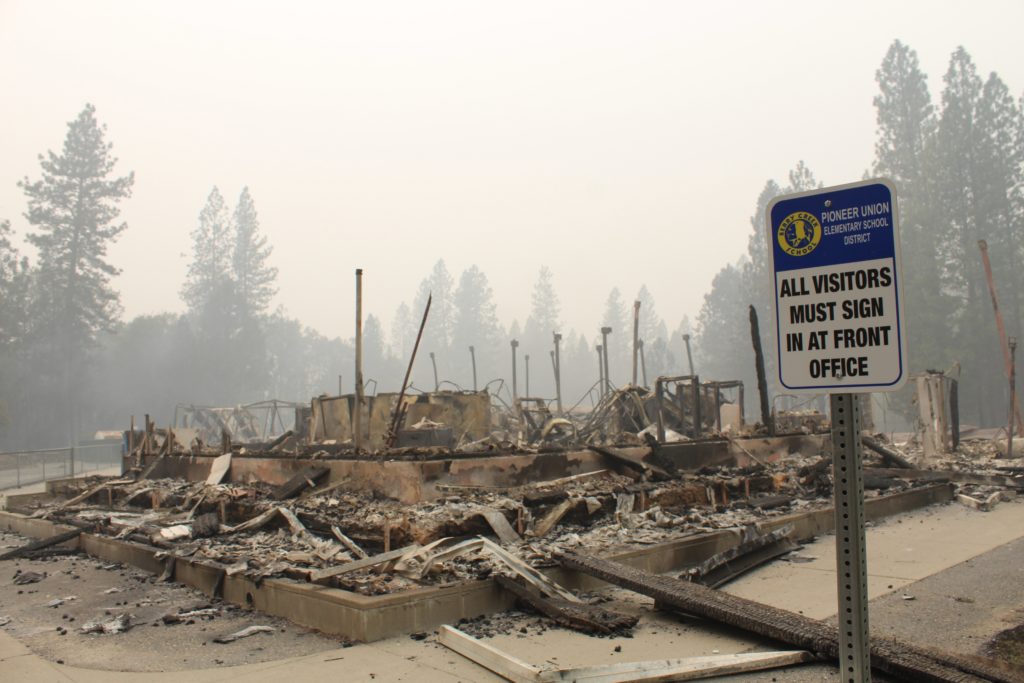
In the days following the fire, the Bourasas began assessing damage to people’s properties and looking for the missing. They explained they’re better suited to this task than outsiders, as they know the lay of the land and Feather Falls’ residents. Together, they located the two fatalities. Though their home and the bar were saved, they lost a rental property, several outbuildings and farming and other equipment.
“The hardest thing about this whole thing for me is, sure, I lost some stuff, but that doesn’t even compare [to others],” Craig said. “It just doesn’t feel fair. Survivor’s remorse is painful. Everyone’s lost everything, and I can go sleep in my own bed. It’s a horrible feeling.”
Both the Bourasas and Molohon said Cal Fire has been very supportive since the fire. In the days following the destruction of Berry Creek and Feather Falls, Cal Fire held a Critical Incident Stress Debriefing where all of the volunteers from the two companies got together to share their experiences. They’ve also been offered ongoing counseling.
Though she admits she’s still struggling with loss and her experiences during the fire, Molohon didn’t hesitate when asked if she’d return to volunteer firefighting in Berry Creek.
“Absolutely,” she said. “I want to go home, and I want to get back to serving my community.”


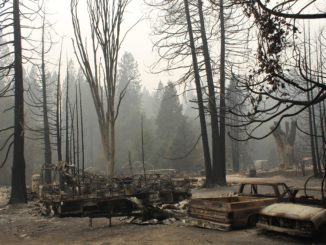
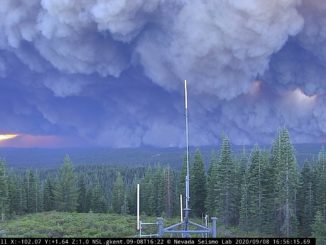
Be the first to comment